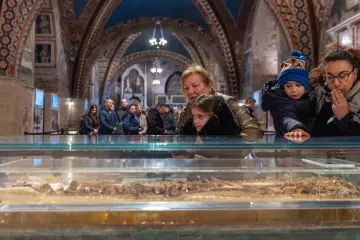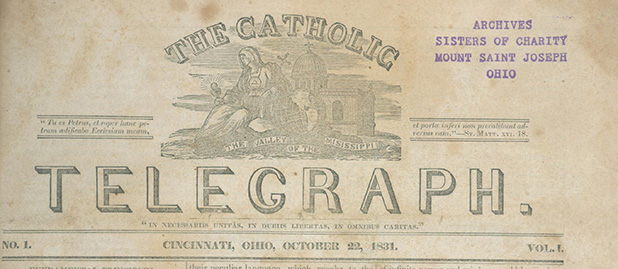Sinners restored to great dignity
May 1, 2012
By Father Earl Fernandes
They were looking intently up into the sky as he was going, when suddenly two men dressed in white stood beside them. “Men of Galilee,” they said, “why do you stand here looking into the sky? This same Jesus, who has been taken from you into heaven, will come back in the same way you have seen Him go into heaven.”
These lines from Acts describing the Ascension of the Lord can be read in conjunction with two verses from the Letter to the Hebrews (4:14-15): Since we have a great high priest who has passed through the heavens, Jesus, the Son of God, let us hold fast to our profession of faith. For we do not have a high priest who is unable to sympathize with our weakness, but one who was tempted in every way that we are, yet never sinned.
A constant lament of moralists is the urgent need for instant gratification in contemporary culture. This need to have everything instantly is driven in part by technology and the demands of the workplace. People want to know and have everything immediately.
Patience is seemingly no longer a virtue but a weakness. To keep up with the demands to provide everything quickly, manufacturers produce shoddy, throw-away products. Very little today is made to endure. Gone are the days of recycling milk or Coca Cola bottles to gain a ten cent deposit. Gone are the days of building a church or a house of stone, brick and marble that might last for centuries.
“Instant” is only the descriptive adjective in the lament of moralists. The noun is gratification. When one hears “instant gratification”, one might be tempted to think of sexuality or pleasure, but gratification can also point to things like food or drink. More often than not, people think about having more rather than being more (by having less). Humans have many appetites, which drive our actions; these appetites need to be rightly ordered and tempered. Disordered appetites lead to selfishness, and the more impulsively, one seeks to satisfy them, without sufficient and reasonable reflection, the more selfish and destructive behaviors become. Temptation, weakness, and unreasonableness lead to sin.
St. Alphonsus Liguori held the person, made in God’s image and likeness, endowed with reason and free will, in high regard. He saw sin as an affliction which wounds a noble yet fragile creature. The mystery of the Ascension reminds us that we have a great high priest who is not unable to sympathize with our weakness. He has passed through the heavens to the throne of God and remains close to each person in his or her weakness. Of course, just because He sympathizes with our weakness, does not mean that He approves of every thought, nor action. He was tempted, but did not sin. There is such a thing as a rightly ordered, virtuous life. The mercy of the Redeemer and His grace heals the wound and restores man to his great dignity.
The Ascension directs the gaze of the Christian beyond the things of this world to the things of God — to the things that last. The mystery of the Ascension invites the Christian to begin to think about living a new life in Christ in the time between His first coming and His second coming. It further teaches us to look beyond the present moment and instant gratification to what the future holds and to the end of time, when the Lord comes in His glory. He will come again in glory to judge the living and the dead.
How will he find the individual soul at death and at His second coming? The early Church zealously prayed, “Come, Lord Jesus.” I wonder if modern people still pray that with great fervor. How many today look at the Last Judgment scene of the Sistine Chapel as just beautiful art? Why not look beyond the moment to the meaning? He will come again. Will you be ready?
“Men of Galilee,” they said, “why do you stand here looking into the sky? This same Jesus, who has been taken from you into heaven, will come back in the same way you have seen him go into heaven.”
Father Fernandes is an assistant professor of moral theology and dean of the Athenaeum of Ohio/Mount St. Mary’s Seminary.













